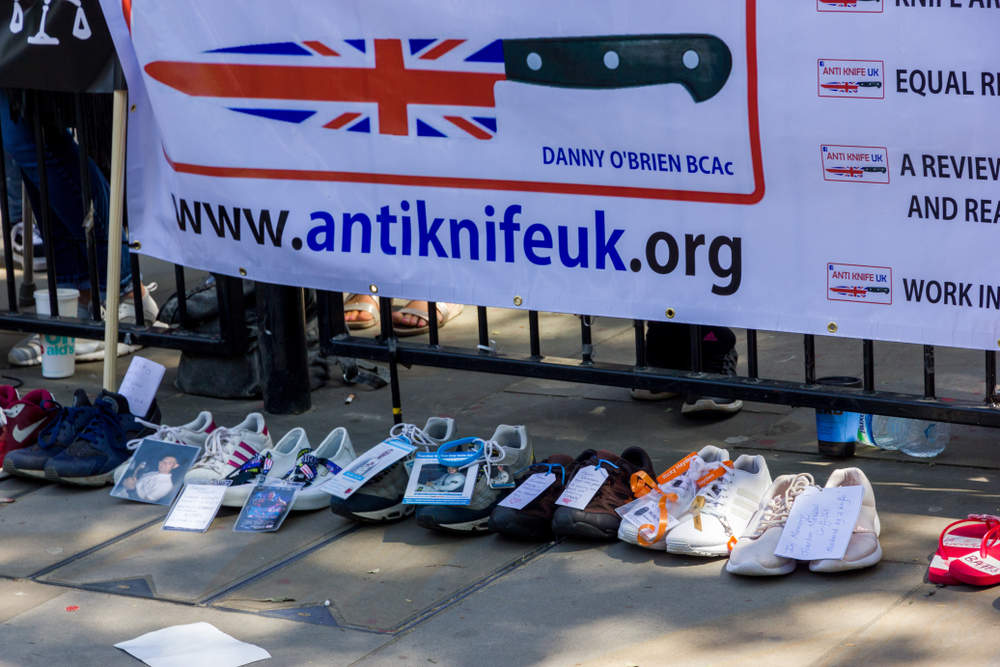
Knife crime is rising at a much steeper rate in home countries and rural regions than in London, Police figures show. Statistics shows a 45.7% average increase in knife-related crimes in 34 English and Welsh countries since 2010, compared with an 11% rise in the capital.
In the home countries, knife crime has risen by an average of 44.8% over the past eight years. Kent recorded the biggest increase of such crimes in England and Wales, it is up by 152% since April 2010. Police chiefs and experts said the figures were partly influenced by gangs targeting new customers in rural areas.
Dr Rick Muir, the director of the independent policing thinktank Police Foundation, said: “Previously, the people selling drugs in Margate or Blackpool would be from those areas. Whereas organised criminal gangs in the bigger cities are exporting drugs directly into these areas.”

Shutterstock.com
The murders of two 17-year-olds Jodie Chesney in London and Yousef Makki in Greater Manchester have prompted police chiefs to demand at least £15 million urgent funding to tackle a “national emergency”.
Nine teenagers have been stabbed to death in London, Birmingham and Manchester since the start of 2019. The number of knife crime offences is remaining higher in major cities but in provinces it is rising since 2010.
Knife crime is up by 11% in London between April 2010 and September 2018. In home countries the increase is much higher. Knife crime incidents in Hertfordshire are up 89%, from 272 offences to 513; Essex is up 43%, from 536 to 766; the Thames Valley is up 23%, from 996 to 1,431.
In Kent, knife crime has risen from 346 incidents to 873 over eight years.
Supt Ricky Fields, Staffordshire police’s lead officer on knife crime, said “The correlation we think it is attributed to is around county lines, urban street gangs,”
“Staffordshire sits on an arterial route between Manchester and Birmingham and some of our neighbourhood areas have seen an overspill around the travelling criminality and bringing crime into that particular community [from the cities].”
Craig Kelly, a criminology lecturer at Birmingham City University, said the data showed that knife crime is a national issue and that politicians, media and academics were “far too focused on London”.
He added: “We’ve focused predominantly on knife crime and violence in London for generations. We’ve literally forgotten to ask what happens to the young lad growing up in Wythenshawe or Longsight [in Manchester].”
A Home Office spokesperson said: “The home secretary has made clear that the rise in serious violence across the country is deeply concerning.
“The Home Office is working hard with police and other partners to tackle violent crime on many fronts and across the whole country.”
The spokesperson added that Sajid Javid had recently met “senior police officers and partners to discuss what more can be done.”
There has been 39 fatal stabbing in Britain since the start of 2019. For the next seven days, police will run Operation Sceptre, using surrender bins, stop-and-search and weapons sweeps in an attempt to stop knife crime.
In England and Wales, there are minimum custodial sentences for anyone aged 16 or over caught carrying a knife in these circumstances:
- Threatening : They are convicted of using the knife to threaten another person where that person is at immediate risk of serious physical harm
- Repeat offenders: They are convicted of carrying a knife in a public place or on school premises, and they have at least one previous “relevant conviction” of possession a weapon or threatening people with a weapon
In these cases offenders who are aged 18 or over would be sentenced to a minimum of six months custodial sentence and a minimum of 4 years. For people aged 16 or 17 the minimum sentence is detention and training order of at least four months.
In Northern Ireland, the minimum and maximum custodial sentences for these offences are the same. In Scotland, the minimum custodial penalties apply and new guidelines mean repeat offenders increase in jail time from four to five years.
Figures published by the Ministry of Justice shows courts in England and Wales dealt with 21,101 knife crime cases in the year ending June 2018. This is the highest number of offences since June 2010.
Children under 16 caught with a knife with no aggravating factors are likely to be given a caution or conditional caution. The guidance says no more than one caution should be issued, anyone caught a second time will be punished more severely.